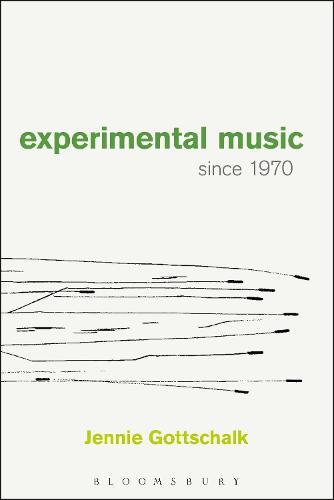Full Product Details
Author: Jennie Gottschalk (Independent Scholar, USA)
Publisher: Bloomsbury Publishing Plc
Imprint: Bloomsbury Academic USA
Dimensions:
Width: 15.20cm
, Height: 2.30cm
, Length: 22.90cm
Weight: 0.576kg
ISBN: 9781628922486
ISBN 10: 1628922486
Pages: 304
Publication Date: 11 August 2016
Audience:
College/higher education
,
Tertiary & Higher Education
Format: Hardback
Publisher's Status: Active
Availability: Manufactured on demand

We will order this item for you from a manufactured on demand supplier.
Reviews
We have needed a reformulation of what experimental music now means, i.e., what has become since Michael Nyman took stock of it in 1974-and this book beautifully fulfills that requirement. Jennie Gottschalk takes a fresh and independent look at experimental music of the last forty years, finding both points of continuation from the previous era and many novel and heartening developments. It is also an adventure story with surprising twists and a panoramic cast of characters, like a novel in which works and ideas are the central figures, seemingly with a collective life of their own. Michael Pisaro, Composer and Faculty Member, Composition and Experimental Sound Practices, California Institute of the Arts, USA Reading Experimental Music Since 1970 it is impossible not to be dazzled first by the range and imagination of experimental music and sound art that is being made today, and second by the way in which Jennie Gottschalk has described and catalogued so much of it, so lucidly. Impeccably and authoritatively researched, by a writer who is both a practitioner and an astute observer, it deserves to be the go-to reference for years to come. Tim Rutherford-Johnson, author of 'Music After The Fall: Modern Composition and Culture Since 1989', UK This book is a unique achievement. Without catering to current fashions or well-worn academic assumptions, it transcends the limits of both journalism and traditional musicology to be both comprehensive and insightful. Reading it has helped me to ask new questions about a history that I thought I knew quite well. David Dunn, Assistant Professor of Music, University of California Santa Cruz, USA
We have needed a reformulation of what experimental music now means, i.e., what is has become since Michael Nyman took stock of it in 1974-and this book beautifully fulfills that requirement. Jennie Gottschalk takes a fresh and independent look at experimental music of the last forty years, finding both points of continuation from the previous era and many novel and heartening developments. It is also an adventure story with surprising twists and a panoramic cast of characters, like a novel in which works and ideas are the central figures, seemingly with a collective life of their own. Michael Pisaro, Composer and Faculty Member, Composition and Experimental Sound Practices, California Institute of the Arts, USA
Experimental Music Since 1970 is destined to become a standard reference work. It is comprehensive and well organised, and it gives a good picture of the scope of the subject. ... Gottschalk's book is somewhat like a brilliant encyclopedia with informative summary passages on various makers and elements of experimental music. ... I will certainly be putting [it] on my booklists for undergraduates. The Wire [Full of] lucid and engaging discussion of so much music new to me, which has had me scurrying to Youtube, download sites and the library to find examples. Gottschalk's book is enthusiastic, highly readable and does not attempt to be too definitive in its explorations. International Times Readers hungry for a broader view of the field will be enticed here by the buffet of younger and lesser-known artists [in the Table of Contents] from all corners of the globe, as well as Anglo-American veterans and icons. Journal of Sonic Studies We have needed a reformulation of what experimental music now means, i.e., what has become since Michael Nyman took stock of it in 1974-and this book beautifully fulfills that requirement. Jennie Gottschalk takes a fresh and independent look at experimental music of the last forty years, finding both points of continuation from the previous era and many novel and heartening developments. It is also an adventure story with surprising twists and a panoramic cast of characters, like a novel in which works and ideas are the central figures, seemingly with a collective life of their own. Michael Pisaro, Composer and Faculty Member, Composition and Experimental Sound Practices, California Institute of the Arts, USA Reading Experimental Music Since 1970 it is impossible not to be dazzled first by the range and imagination of experimental music and sound art that is being made today, and second by the way in which Jennie Gottschalk has described and catalogued so much of it, so lucidly. Impeccably and authoritatively researched, by a writer who is both a practitioner and an astute observer, it deserves to be the go-to reference for years to come. Tim Rutherford-Johnson, author of 'Music After The Fall: Modern Composition and Culture Since 1989', UK This book is a unique achievement. Without catering to current fashions or well-worn academic assumptions, it transcends the limits of both journalism and traditional musicology to be both comprehensive and insightful. Reading it has helped me to ask new questions about a history that I thought I knew quite well. David Dunn, Assistant Professor of Music, University of California Santa Cruz, USA
Author Information
Jennie Gottschalk is a composer and independent scholar based in Boston. Since receiving a doctorate in composition from Northwestern University in 2008, she has traveled extensively to gather first-hand information about experimental music practices. For additional resources related to this book, please visit the author’s website at soundexpanse.com.




